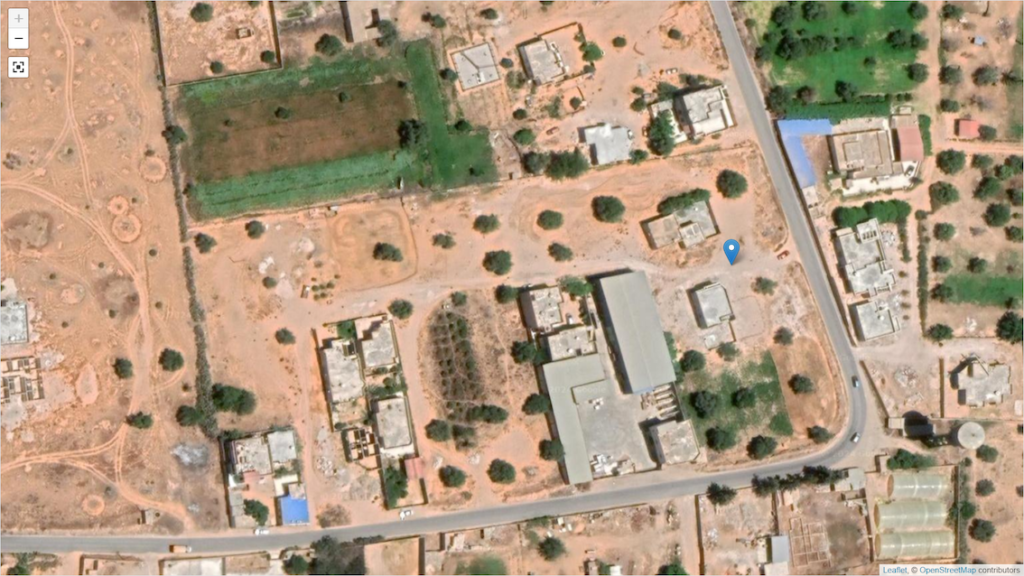
Satellite image of compound of Osama prison, officialy called (Al-Nasr) Az-Zawiyah Detention Centre. Photo: Global Detention Project
Our activist’s network Alarm phone is regularly contacted by people searching their relatives, as there are no official structures existing for people on the move crossing the Mediterranean to Europe, which is highly criminalised.
Many people get stopped and intercepted soon after departure from Libyan shores, forced back and get detained in prisons to make money out of them.
We share an experience of the infamous Osama prison, that many migrants know:
In mid of May a husband was reaching out to us, looking for his wife from which he had not heard since 2 weeks. He told us his wife boarded a rubber boat together with 68 other people, among them 9 women and 4 minors. End of May he informed us that his wife was alive in Libya.
Below we share her experiences:
“We started during the night. We sailed one day, but in the morning of the second day, the engine stopped working. Soon, water entered the boat at the back. I was in the front of the boat, i did not understand what was going on, if the boat was broken. Also our phones did not work, neither the satellite phone. I do not know why, I think it got wet in the boat. There was a lot of water in the boat.
We were five days at sea. During this time, eleven people died, due to hunger or thirst. Among them was the driver. After five days we were found by the so-called Libyan Coast-Guard. I do not know how they found us, we could not speak to anyone.
They brought us back ashore and then we were transferred to Osama prison. There we suffered so much. If you arrive, they will take away your money and your phone. Sometimes, they arbitrarily beat people, mostly the men, they also flock them. Also the people from the boat were beaten. There was not enough food or water, the medical assistance was very bad.
They put 100 people together in a big room, you cannot sleep, there is not enough space. They will ask you to pay 1000 or 2000 Euro to be released. If you cannot pay, you will stay in the prison for up to one year.
Some people die there, or the people sell you to another bad place. Some people who were on the boat with me are still in Osama prison. After twenty days, I was released because I managed to pay them enough money. There is so much suffering in this place.”
While the Central Mediterranean is closely monitored by several FRONTEX airplanes and drones, it becomes clear that these assets do not contribute to lessen deaths at sea.
During these five days, Frontex’ SPARROW 4 (HEX: 4D2444) was flying from May 3 to May 6 in the area where the boat must have been. These are the first 3 days of the boats trajectory, nonetheless the surveillance did not prevent the death of 11 people on board of the rubber boat. On the contrary, it is shown again how aerial surveillance is aimed at preventing people on the move to reach Europe but not intended to save lifes.
How the people finally got found by the so-called Libyan Coast-Guard has not become clear. However, it is a horrendous proof how violent the apparatus combined of scLyCG and armed groups for people on the move.
Osama prison is located in Zawiyah. For many years, it has been infamous for its conditions and violent treatment of its detainees. It is controlled by Al-Nasr Brigade, which has strong ties with the Stabilisation Support Apparatus of Zawiyah.[1] The SSA in Zawiyah got more and more formalised and became part of the local so-called Libyan coastguard (scLyCG) branch, being in command of at least four patrol boats (2023).[2] This is even more worrying, considering the fact that the scLyCG of Zawiyah is said to be controlled by Abd al-Rahman Milad, aka al-Bija, who has not only strong ties with former Italian minister of interior Marco Minniti[3] but also with Al-Nasr Brigade. Regarding al-Bijas central position, the existence of a direct pipeline from sea to detention camps becomes evident, systematically being used to extort ransoms from people on the move after being intercepted or rescued by the scLyCG.
Again, it becomes clear, no more people must be returned to Libya.
As long as we are confronted with such experiences, the Alarm Phone will continue trying to support all people on the move and to end this deadly violence.
________
[1] https://civilmrcc.eu/stability-support-apparatus-a-worring-new-actors-in-the-central-mediterranean/
[2] https://globalinitiative.net/wp-content/uploads/2023/09/Rupert-Horsley-Libya-Sophisticated-smugglers-thrive-as-Libyan-goernance-stagnates-GI-TOC-September-2023.pdf
[3] https://www.theguardian.com/world/2021/apr/13/libya-releases-most-wanted-human-trafficker-bija